Curious about the difference between the Bernese vs Greater Swiss Mountain Dog? If so, It is no surprise. Both the Bernese and Swiss Mountain Dogs are large working breeds with a lot in common. They are, however, both distinct in a variety of ways. We aim to address some of these differences in this article.
Bernese Mountain Dog vs Greater Swiss Mountain Dog: A Comparison
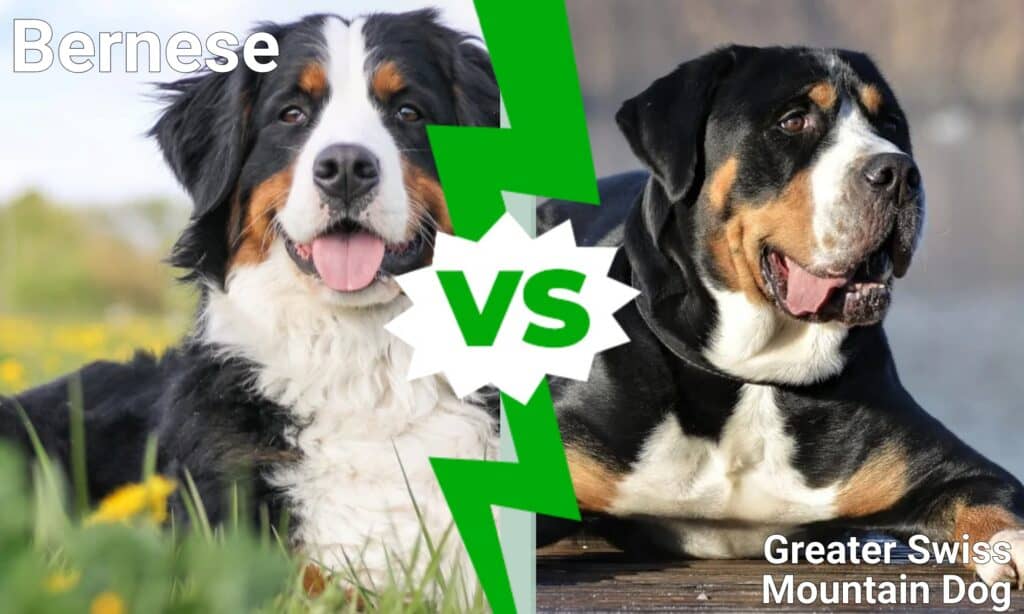
| Key Differences | Bernese Mountain Dog | Greater Swiss Mountain Dog |
|---|---|---|
| Height | 24 – 28 inches | 23.5 – 28.5 inches |
| Weight | 80 to 110 lbs. | 130 to 135 lbs. |
| Coat type | Long, Thick, Straight, Double Coat | Medium, Dense Outercoat, Thick Undercoat |
| Colors | Black and White, Rust Markings | Black and White, Rust Markings |
| Temperament | Affectionate, Smart, Devoted | Alert, Fearless, Protective, Confident |
| Trainability | Above Average | Average |
| Life Expectancy | 7 to 10 Years | 10 to 12 Years |
| Health Problems | Progressive retinal atrophy (PRA) Von Willebrand’s Disease | Epilepsy, Bleeding Issues, Cataracts |
Key Differences Between Bernese Mountain Dog vs Greater Mountain Dog
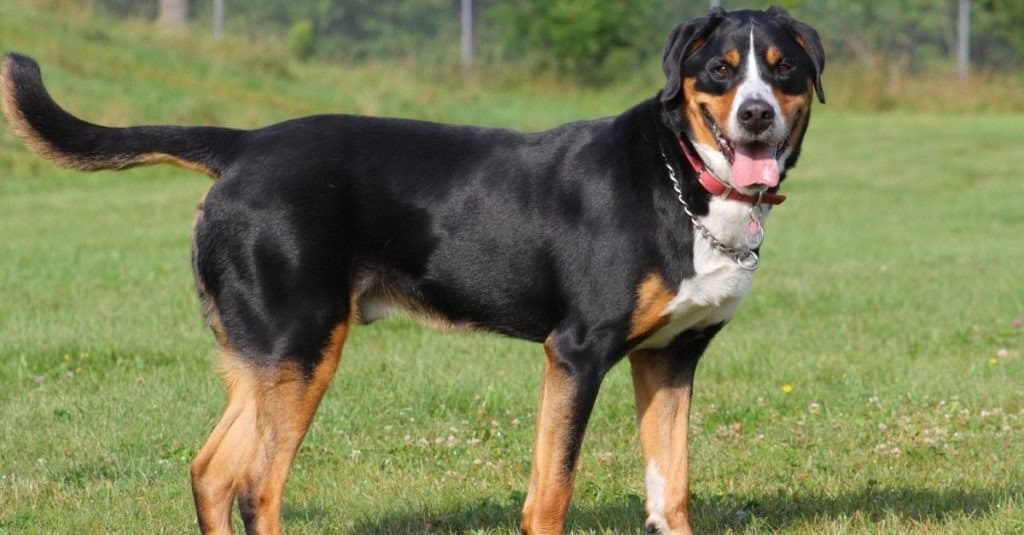
The Bernese Mountain Dog has a short, dense outercoat and thick undercoat, while Greater Swiss Mountain Dogs do not.
©Nick Chase 68/Shutterstock.com
There are many differences between Bernese Mountain Dogs and Greater Swiss Mountain Dogs. Both breeds are Swiss worker dogs. Swiss and Bernese Mountain Dogs are similar in appearance, with thick bones and powerful muscles. Both breeds are highly regarded for their familial commitment and affectionate dispositions. However, there are some distinctions to consider, particularly if you’re considering adopting one of these magnificent breeds. Let’s explore…
Appearance
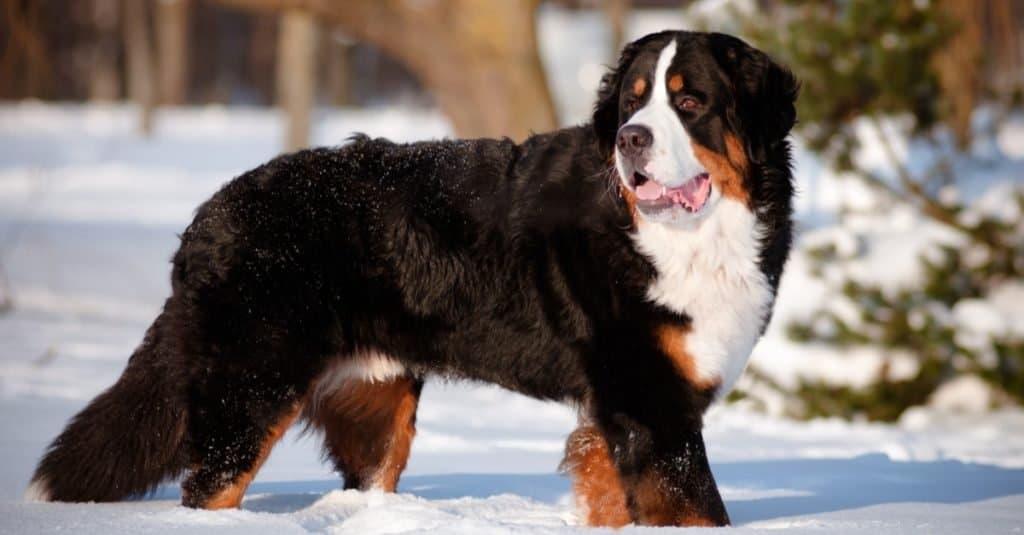
Bernese Mountain dogs have thick coats, while Greater Swiss Mountain Dogs have shorter fur.
©otsphoto/Shutterstock.com
Bernese Mountain Dog vs Greater Swiss Mountain Dog: Height
Both canines are almost the same height, measuring 23.5-28.5 inches for the Swiss Mountain Dog and 24-28 inches for the Bernese Mountain Dog.
Bernese Mountain Dog vs Greater Swiss Mountain Dog: Weight
Despite its enormous size and weight, the Bernese mountain dog is frequently lighter than its Swiss counterparts. Bernese males weigh between 85 to 110 pounds, while females weigh approximately 80 to 105 pounds. Swiss Mountain Dogs weigh between 130 and 135 pounds, slightly more than other breeds.
Bernese Mountain Dog vs Greater Swiss Mountain Dog: Coat Type
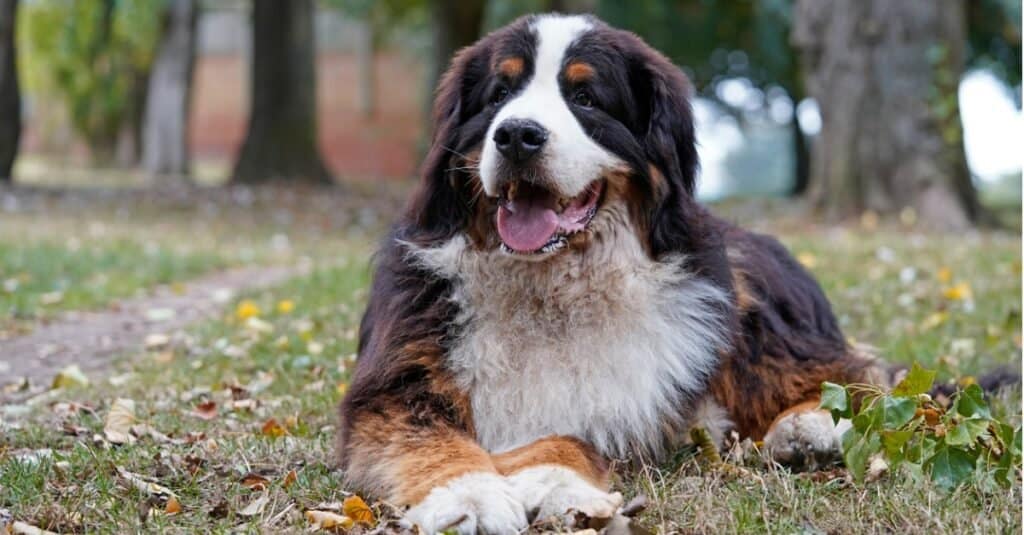
The Bernese mountain dog has the shortest lifespan of all dog breeds, while the Greater Swiss Mountain Dog lives a bit longer.
©iStock.com/Kriste Sorokaite
This is most certainly one of the biggest distinguishing physical features of the two breeds. For example, the Swiss have a shorter, denser outercoat with a thick undercoat. Their coat sheds minimally and requires minimal grooming to upkeep.
The Bernese Mountain Dog’s longer outer coat and thick, woolly undercoat shed heavily twice a year, requiring regular grooming to upkeep.
Bernese Mountain Dog vs Greater Swiss Mountain Dog: Colors
The classic Swiss colors of black, white, and rust are seen in both breeds. Both purebred Mountain Dogs are tricolored, with tones of black, white, and rust-colored patterns above the eyes, sides of the mouth, front legs, and out around the white chest.
The Swissy and Berner standards, on the other hand, differ slightly in terms of white and brown patterns, as well as head form. For example, the Swissy’s markings are more varied than those of the Berner, implying that its coat is not as distinctive.
Characteristics
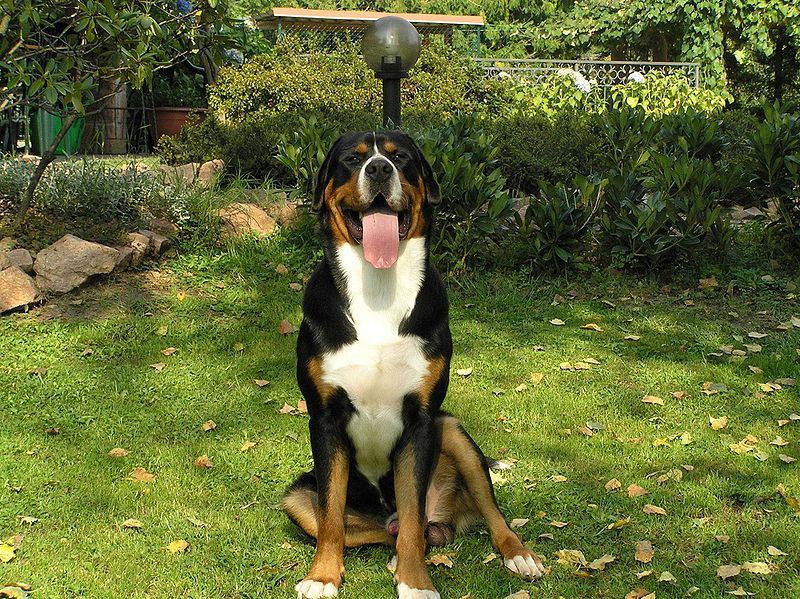
Greater Swiss Mountain Dogs are alert, courageous, and protective, while Bernese Mountain Dogs are gregarious.
©Kikko88 – Public Domain
Bernese Mountain Dog vs Greater Swiss Mountain Dog: Temperament
Bernese Mountain Dogs are bright dogs that benefit from positive reinforcement training. Be patient if you plan to adopt an adult Berner. Since they develop close bonds with their owners, they may adjust to new situations more slowly than usual. They are gregarious dogs that enjoy meeting new people and pets, but are also amiable, pleasant, and obedient companions when properly trained. Additionally, they are kind toward dogs and children.
The Greater Swiss Mountain Dog is alert, courageous, and protective. The size of the Swissy, along with their strong, booming bark, makes them an excellent guardian. However, they are kind pooches at heart, devoted to their family, and affectionate toward children.
Bernese Mountain Dog vs Greater Swiss Mountain Dog: Trainability
Bernese Mountain Dogs are incredibly easy to train if you give them time to process the task at hand. Most importantly, they have a positive outlook on life and thrive on praise and reward.
Although the Greater Swiss Mountain Dog is normally easy to train, it is critical to begin obedience training and socializing with the Swissy as soon as possible. Additionally, anticipate a lengthy puppyhood, as the Swissy is slow to mature, both physically and intellectually, and can remain puppy-like in personality until they reach the age of three.
Health Factors
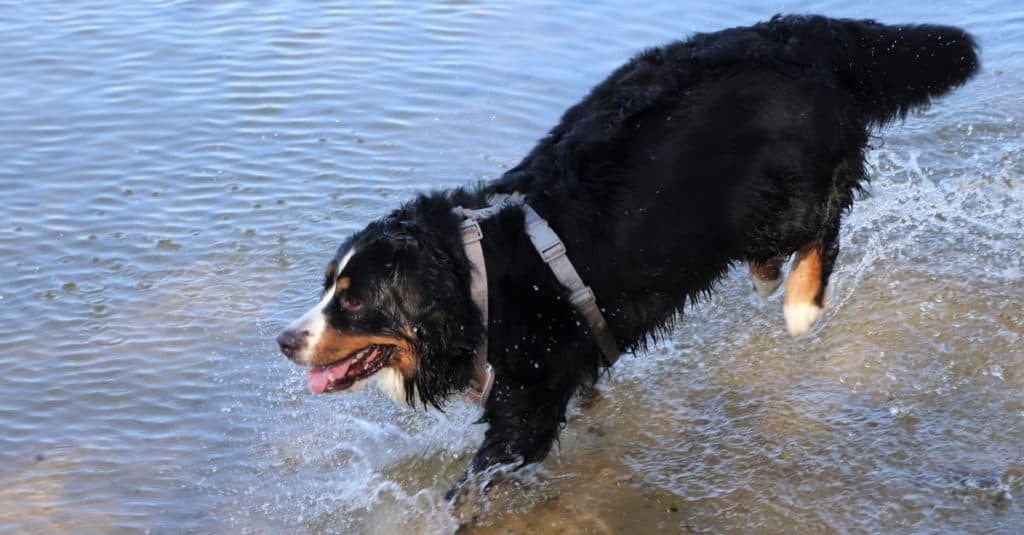
The Bernese Mountain Dog enjoys positive reinforcement, while the Greater Swiss Mountain Dog is slower to mature.
©T. Miettinen/Shutterstock.com
Bernese Mountain Dog vs Greater Swiss Mountain Dog: Life Expectancy
Greater Swiss Mountain Dogs have a slightly higher life expectancy, ranging between 10 and 12 years. Whereas the Bernese Mountain Dog typically lives for 7 to 10 years.
Bernese Mountain Dog vs Greater Swiss Mountain Dog: Health Problems
While the Bernese Mountain Dog is a generally healthy breed, they are prone to certain conditions such as hip and elbow dysplasia, bloat, and cancer, among other things. Hip and elbow dysplasia, bleeding issues, eye diseases, stomach torsion, epilepsy, and female urinary incontinence, are all prevalent health problems in Greater Swiss Mountain Dogs.
Wrapping Up Bernese Mountain Dog vs Swiss Mountain Dog

Greater Swiss Mountain Dogs live an average of 10 to 12 years, while Bernese Mountain Dogs live 7-10 years.
©Dora Zett/Shutterstock.com
Swiss and Bernese Mountain Dogs are both reasonably healthy breeds large dog breeds that are affectionate and loving, making them excellent family members. However, if you are considering adding a Swiss or Bernese to your home, it is critical to recognize that while neither breed is destructive, they are both physically intimidating. The Swissy is more intimidating due to its guarding instincts and powerful bark, whereas the Bernese has a softer, gentler, and shyer attitude. Regardless, both types seem well worth the investment because of the devotion, affection, and companionship they bring.
The photo featured at the top of this post is © iStock.com/vetdoctor
Ready to discover the top 10 cutest dog breeds in the entire world?
How about the fastest dogs, the largest dogs and those that are -- quite frankly -- just the kindest dogs on the planet? Each day, AZ Animals sends out lists just like this to our thousands of email subscribers. And the best part? It's FREE. Join today by entering your email below.
Thank you for reading! Have some feedback for us? Contact the AZ Animals editorial team.






